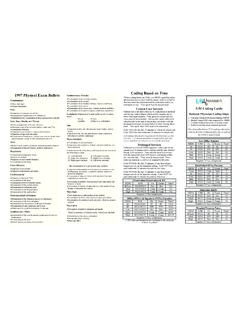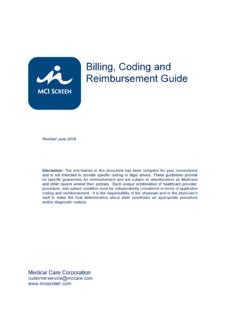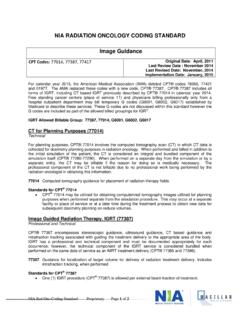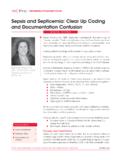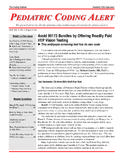Transcription of Coding for the Office Facility and Supplies
1 Original 12-2002 Revised 10-2007 1 Coding FOR THE Office AND Supplies Billing as Office To qualify as an Office , the space must be rented or leased at a fair market value, there must be a written agreement for the rental or lease and the agreement must be for at least one year in duration. The staff must be an expense to the practice and can be either employed or leased. If hospital space is rented or leased for an Office , this space must be separate and distinct space, not included in the hospital s cost-reporting space. All costs associated with providing a procedure in this space to include the equipment, staff, drugs and Supplies must be incurred by the provider to bill as an Office based procedure.
2 Site of Service Differential The relative value differential was created by CMS to assist physicians providing services in an Office with additional funds to cover some overhead of practice expense. When the above conditions are met, the correct place of service for billing purposes is 11- Office . Recognize that some practices may have more than one places of service. For instance, a practice that leases space from a hospital and employs staff solely for Evaluation and Management Services would bill those services as place of service 11- Office . Their procedures may still be performed in the hospital or an Ambulatory Surgery Center where the costs for providing those services is consumed by the other party.
3 In this case, the procedures performed with someone else s equipment, Supplies and staff would be then be billed with the place of service 22- Outpatient Hospital or 24- Ambulatory Surgery Center. Office based Surgery Many State Departments of Health have regulations regarding what procedures they consider to be safe and appropriate to be performed in a physician s Office . Typically, these regulations have to do with performing procedures that carry a high infection risk and/or with the use of certain levels of anesthesia. This gives the individual State Department of Health jurisdiction over what they allow in their State.
4 The States that have currently adopted standards for Office based procedures with certain levels of anesthesia are as follows: Connecticut, Pennsylvania, Rhode Island, California, Florida, Texas, New Jersey, Arizona, Ohio, Colorado, Washington DC, New York, Oklahoma, South Carolina and Oregon. The regulations vary from the requirement that the Office is State Licensed, State Registered and/or Office based Accredited. State specific summaries on jurisdiction can be found on the Accreditation Association of Health Care website ( ) Accreditation For Office based Practices The value of accreditation has become a benchmark of quality not only to those involved in health care delivery and management, but to the general public and is a measure of professional achievement and quality of care.
5 In Office based settings, even in States that do not require accreditation, this status may prove to expedite third-party payment and favorably influence managed care contract decisions. Accreditation may also favorably influence liability insurance premiums. Rules for Office accreditation include: no more than four surgeons and two operating suites and have been in business for at least six months prior to the accreditation survey. Note: early option is available to satisfy State requirements. The practice must also be a formally organized, legal entity in compliance with applicable federal, state and local regulations and provide medical care under the direction or supervision of a single physician or a group of physicians, dentists, or podiatrists accepting responsibility.
6 Accreditation is available through American Association of Ambulatory HealthCare (AAHC), The Joint Commission (JCAHO) and American Association for Accreditation of Ambulatory Surgery Facilities (AAAASF). For Office based practices they will differ in survey style, but use common guidelines aimed to ensure a high quality of care for patients. Original 12-2002 Revised 10-2007 2 The Accreditation Process The process begins with an application and pre-survey questionnaire. A manual which describes the Accreditation standards for Office based surgery can be purchased and should be used as a self-assessment tool.
7 The manual includes topics for policies and procedures, emergency equipment, appropriate staffing, evaluation of quality and risk management. An on-site survey is then conducted by survey team experienced in both the clinical and administrative aspects of ambulatory health care. Following survey the team makes an accreditation recommendation which is then reviewed by the Accreditation Committee, who makes the final decision. Accreditation may be awarded for six months, one year, or three years. The accreditation decision could be deferred or denied as well. Procedure Billing in the Office When billing for procedures done in the Office setting, it is important to understand the payment rules of different payors.
8 In fact, it is a given that only Medicare recognizes the site of service rule; commercial payors that allow a higher payment for Office services vary by region. Step one in this process is to ascertain the fee schedule for all the practice s payors. If the payor does not recognize a site of service differential, negotiations should include some form of added reimbursement for procedures performed in the Office . In addition to payment for the procedure, whether it has a site of service enhancement or not, ensure that payment will be made for both the professional and technical components (global) on the use of the C arm for needle localization under fluoroscopic guidance or for the provision of supervision and interpretation study as applicable.
9 Medicare and other payors will reimburse for this global as well as injected drugs. Although Medicare considers payment for the procedure inclusive of Supplies , other payors may pay a supply or tray fee for Office based procedures. With Commercial and Workers Compensation payors, it is important to recognize that some Office based practices may be able to negotiate a global fee to include the professional fee and all incidentals for the use of the procedure room. Bear in mind, however, that this is not a Facility fee. Local and state law as well as third party payor policies including, Commercial and Workers Compensation, typically require the Facility to be licensed and Certified in order for Facility fees to be paid.
10 Although there is no law prohibiting a practice from billing Facility fees (Medicare excepted), prosecutors could use the mail fraud or wire fraud statutes to allege a general "scheme to defraud" and allege that the MD billed as if he were a Facility when the industry standard is that a Facility must be licensed as such. Many Workers Compensation plans publish their fee schedule and billing rules on the internet. The following are some important items to clarify with the payors because they often impact reimbursement significantly: I. Fee Schedule y Medicare regulations do not bar providers from sometimes collecting payment rates lower than Medicare rates.

